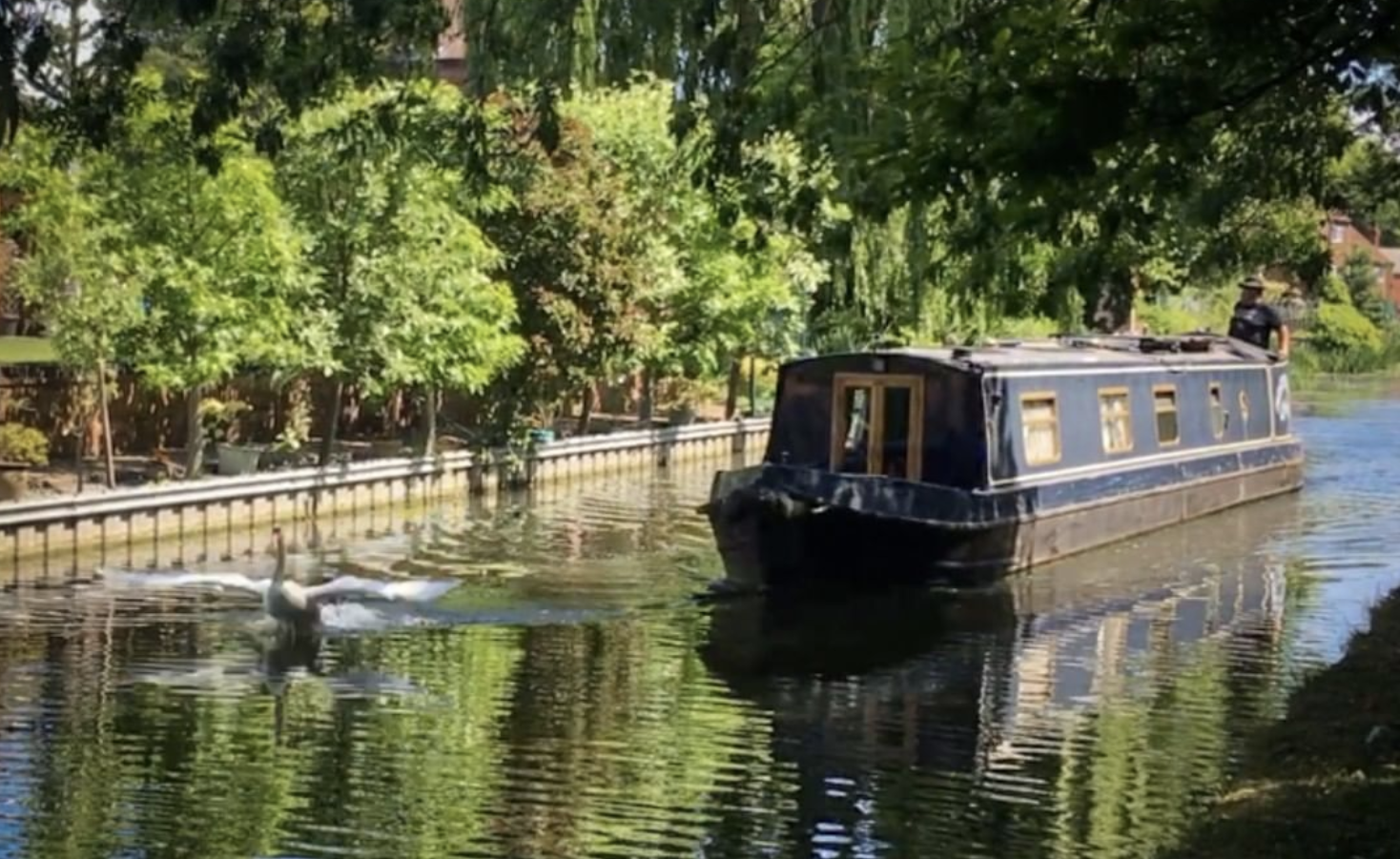Lockdown Aboard Narrowboat Perseverance on the Chesterfield Canal
When your life is cruising on a narrowboat one of the first things you learn is that you're not exactly an unstoppable force; whether it's the bank, a bit of submerged stone, a poorly timed lock gate swing, an inexplicable refrigerator on the bottom of the canal, or an errant rubble sack that's just managed to clip the prop, almost anything can bring your progress to a swift and unexpected halt. You grow to expect it, to anticipate interruptions, to adapt; all so that you can shrug it off, get the engine started, keep trimmed and carry on. And then comes the day you slam into a pandemic. When that strange day comes, the very best you can do is hope that you're somewhere on the Chesterfield Canal. Luckily, that's exactly what happened to us.
The narrator of this tale is Michael, and for my sins in a past life I was born an American, which means I'm afraid you'll have to excuse my atrocious pronunciation, spelling, and lack of metric measurements. My wife, Jo, however, is English, and for her sins in this life she's been saddled with me. Our English Springer Spaniel is George, who strives to redeem us both while simultaneously ensuring the canals, rivers, and oceans are well stocked with rubber balls. Together we're the crew of the narrowboat Perseverance (Persey, to her friends), and for the last few years we've been documenting our lives cruising the waterways on our YouTube channel, Minimal List. More specifically Jo's been documenting my mad quest to get to the very ends of every canal and river and branch we can reasonably safely navigate. It's that quest that brought us, in March 2020 -- the international year of hindsight -- off the flooded Trent with an almighty bang and into West Stockwith Basin.
We'd arrived with a plan to leave Persey in that Basin, drop George off with Jo's parents, and board a flight to Canada to visit my mother, who had not been well, but that all ended the morning of our flight at Heathrow. At that point most of the world was just learning the word "coronavirus", the WHO had just officially declared a pandemic, and government actions the world over were scattered, unpredictable, and in at least one case seemingly utterly and irrevocably mad. A flood of announcements from both the Canadian and UK governments made it obvious we might well end up trapped either side of the flight, so when the airline offered to cancel our tickets we decided on the better part of valor, canceled them, retrieved a rather befuddled George from his grandparents' care, and made our way back to Persey.
Shops were bare, people were hoarding in a panic or out of a misguided desire to profit, but cases were still quite low and there'd been no move yet towards any form of lockdown; it was a strange time, but being cruisers we expect, anticipate, and adapt. So Jo and I sat down and set a course, thinking we'd make it to the end of the canal and back in a couple of weeks, while we waited for everything to blow over. Which, of course, it most certainly did not.
The day before we arrived in Retford the pubs had been ordered closed, and somewhere between springing off that morning and mooring up that afternoon outside the fire station the lockdown proper had been ordered. One final shop, as for the first time in my life there were queues outside a grocery store whose shelves were largely empty and there were limits on the number of items you could purchase, and then back to the boat to hunker down. Almost two weeks we sat there, on most days we only left the boat by alternating once a day to walk George in the oddly empty King's Park, as we slowly drained our already low water tank right down till the shower dregs we'd taken to using to wash our clothes started coming out orange with rust and muck. When some bored and drunk youths untied us and set us adrift we just tied up again -- albeit with a lump hammer at hand near the door -- we were so resistant to moving. An ASDA toilet became our Elsan -- thankfully we have a separating composter, so no harm and minimal foul -- on our rare grocery runs. The town, though lovely and friendly, was ghostly when we ran out of LPG and I carried our empty tank over my shoulder past the Sebastapol Cannon outside St. Swithun's Church, on my way to get a refill at the one petrol station that still had stock. I'll never forget the sound of the alarm that had begun ringing inside a hastily abandoned shop the day lockdown began, and would still be bleating incessantly three months later. It felt like something out of Cormac McCarthy's "The Road" as I awkwardly pushed a borrowed cart with some odd-mix groceries and a full LPG bottle past the shuttered high street shops, then took it rattling back to the Morrison's so they wouldn't run out.
But we expect, anticipate, and adapt; so Jo and I developed a routine of moving Persey the few miles up to the Forest Locks to the nearest service point for water, then back again to Retford when the food ran low. Rinse, dry, and repeat, over and over. It was a huge uplift to our moods to watch the shockingly large carp and eels gliding along beneath us in brilliantly clear, undisturbed water, enough to make it worthwhile to brave the steadily worsening filamentous algae bloom. We got to know those locks far better than any others on the whole system. I cannot remember how many times I'd push to the same small winding hole, just to turn again, frustrated by not making progress, but hopeful for the shower and a walk in the nearby wood with George.
Unlike many, we usually move a lot and far afield; in the three months before the winter stoppages we'd gone from Lancaster to Liverpool, across the Mersey, up the Ship Canal to Manchester and crossed to Yorkshire through the Standedge Tunnel; while CoViD-19 raged and the NHS fought its lonely war we spent the same amount of time sat in a 57' by 7' steel box, waiting to either get sick or not, never straying further than the winding holes below Retford and above Charlie's Lock, a 3 mile stretch of recurring déjà vu. We're not used to that long in one place, so we had to figure out new ways to keep busy and entertain ourselves. Jo had her editing, I took to imagining names for the various fish I'd watch out the duck hatch, and George slowly, but surely, became intimately familiar with every muddy nook and cranny of King's Park, which meant I often had to trick him into getting more familiar with the River Idle to clean off before heading back into the boat.
We'd never taken such time to get familiar with a canal and its rhythms ... we watched the algae bloom expanding on every trip up the locks, and the sudden arrival of first the gooey masses of frog's eggs and then endless tadpoles, slowly growing bigger among the blanket weed. Which meant we watched the fish seem more plump, with an amphibian buffet at hand (or fin, possibly), and the visits of the stalking heron and the lightning blue flash of a kingfisher became more frequent. It was lovely. As were the people of Retford, who we slowly got to know at a two meter remove. Though there was much necessary boredom in the restrictions, there was still beauty to be had, if you remembered to look for it.
Slowly, towards the end of June, it was announced that restrictions on movement would be lifted in stages, with us liveaboard boaters allowed to move first. Though we'd grown accustomed to Retford, as the shops started to re-open and the streets started to fill we itched to move on, and so as soon as we were able we finally decided to burst through the invisible barrier above Charlie's Lock that had held us in. Which we were barely able to do, the blanket weed had socked in so badly that our final trip up the Forest Locks was an incredible slog spent mainly with my arm down the weed hatch. We nearly gave up on reaching the end, but we got word that a weed boat was working its way down, so we pushed on, and after several more days of tough, hot slog -- including using our lines to dislodge a downed willow limb, and waiting for a valiant crew to chainsaw up a larger tree as a herd of cattle watched in awe -- we finally made it through Worksop and to the bottom of the locks at Shireoaks. We were the only boat moving the entire time, people would stop in amazement at each lock and bridge to tell us we were the first they'd seen move since the lockdown began. Which was lovely, as it meant that the whole flight of locks up to Kiveton were set to our advantage by the inevitabilities of time and gravity, but also meant that the wood of the heavy gates was bone dry, cracked, and leaking like mad. Still, we did the flight in a day, aided by the shallowness of the staircase chambers that let me get out of the boat at each lock to help with the gates. Finally we inched along the wooded valley to the final winding hole, where Jo bravely beared with as I turned Persey round and backed her up the last half mile of shallow, weed-choked water to reach the bricked up end of the Norwood Tunnel. Which felt like quite an achievement, seeing as it'd taken us more than three months to travel just 31 miles, by an incredible margin our slowest speed yet. Jo posted a picture on Twitter, which led to us being hand-delivered -- but socially-distanced -- our most treasured canal head plaque just a few days later, though we won't truly feel like we've earned that till we can return once the canal is back in water all the way to Chesterfield itself.
The trip back down was aided both by gravity and the work of the weed boat crews, and it took us just a few days' cruising -- and a bit of weed warring -- to find our way back to Charlie's Lock. Our return trip to Retford was oddly emotional, and we took an extra day to let George run more freely through the now much busier King's Park. It was with some sense of thanks and sadness that we finally passed the winding hole that had marked the other limit of our lockdown days, and just a couple days' cruise later we spun around to moor up once more at the finger moorings at West Stockwith, exhausted by the newfound heat of summer.
All of the odd, unexpected impediments of the pandemic were gone, at least for the moment, and the country around us had woken up to a new normal. We'd seen it all as relative strangers to this somewhat sadly overlooked waterway, which for us has earned its reputation for charm and beauty like no other. And so it was with quite a bit of love, and some sadness, that we got up the next morning and made ready to leave. The keeper opened the gates for us at our appointed hour, and as the nation shrugged off the first wave we got the engine started, turned out onto the rushing Trent, kept trimmed, and carried on.

